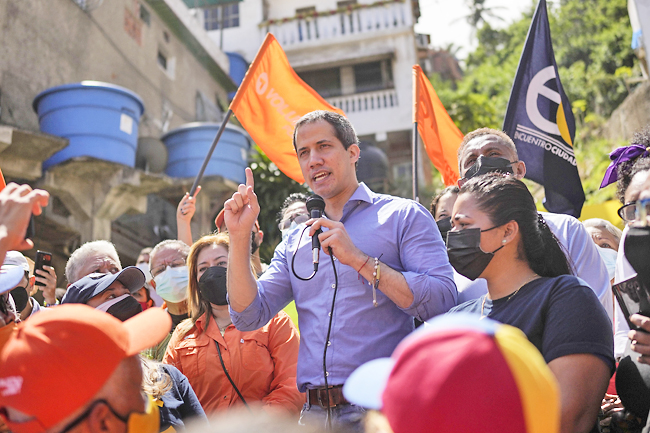CARACAS, VENEZUELA (AP) – Juan Guaidó has been the face of Venezuelans’ efforts to restore their democracy since he took to the streets to challenge the rule of President Nicolás Maduro in early 2019.
But the 39-year-old former head of the country’s legislature, the National Assembly, is at risk of being pushed aside by some of his one-time allies who feel that his leadership of the opposition isn’t working and that they need to find a better way to connect with disillusioned voters ahead of the 2024 presidential elections.
Three of the four main opposition parties that make up the so-called interim government voted on Thursday to replace Guaidó with a leadership by committee.
Guaidó, fighting for his political future, has warned that such a move would be unconstitutional and open the door to recognising Maduro’s “dictatorship”.
But the former lawmakers – who were elected to the National Assembly in 2015 but saw their terms expire five years later and now operate as a symbolic shadow to Maduro’s rubber-stamping legislature – pressed ahead, approving the measure by a vote of 72 to 23. A second vote to ratify the decision was expected to take place in the coming days
“The process that we began in January of 2019 has weakened and is no longer perceived as a real option for change,” the group of opposition leaders said in a statement on Wednesday.

“This country requires new paths that will help us to return to democracy.”
In January 2019, the National Assembly, then controlled by the opposition, voted to stop recognising Maduro as president after several top potential opponents were barred from running against him.
It then appointed Guaidó, a backbench lawmaker who was one of the few leaders in his Popular Will party to avoid arrest or exile, to be the nation’s “interim president” following the order of succession outlined in Venezuela’s constitution.
Guaidó was quickly recognised as Venezuela’s legitimate leader by the United States (US) and dozens of governments in Europe and Latin America. But his interim government was unable to gain control of any government institutions and, crucially, failed to win over the military.
In the meantime, Maduro has only strengthened his grip on power, even as regular Venezuelans suffer from high inflation, deepening poverty and widespread shortages made worse by US oil sanctions.
Venezuelan analyst at the Washington Office on Latin America Geoff Ramsey said the proposal to reshape the interim government reflects efforts by the opposition to adapt to Venezuelans’ growing frustration.
In an opinion survey conducted in November by one of the nation’s leading universities, 57 per cent of Venezuelans said the interim government should be dissolved and only six per cent said they would vote for Guaidó in the event of primaries to see who would run against Maduro should he decide to seek a third term, as is widely expected.
“Venezuelans have moved on from the interim government experiment,” Ramsey said.
“This proposal is a recognition from the wider opposition that they need to find ways to reconnect with the population beyond simply sitting back, folding their arms and waiting for the military to unplug from Maduro.”
Venezuelan analyst at the think tank the International Crisis Group Mariano de Alaba said removing Guaidó from his post would make primaries more competitive because he wouldn’t have as much access to the funds and machinery of the interim government.
“They are trying to close this chapter because the opposition is seeking a new leader,” de Alba said.
Guaidó officially lost his position as the head of the National Assembly at the start of 2021, when the legislature’s five-year mandate ended. But opposition parties boycotted congressional elections staged that year by Maduro’s government, and instead, lawmakers chosen in 2015 continued to legislate in parallel to the Maduro-controlled National Assembly.
Earlier this month, Guaidó asked the opposition to extend his term as leader of the interim government for another year.
But on Wednesday, 67 opposition legislators signed a statement saying they would vote to change how the interim government operates.
One of the circulating proposals calls for the creation of a commission comprised of opposition legislators that will promote the transition to democracy, handle cooperation with foreign governments and protect Venezuelan government assets abroad.





